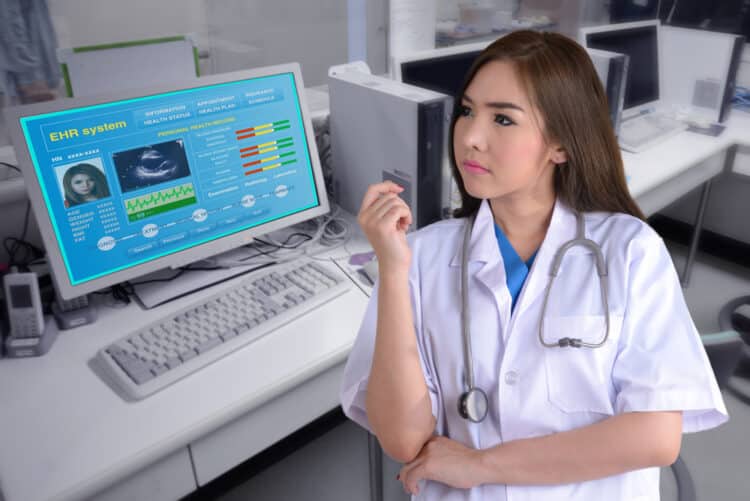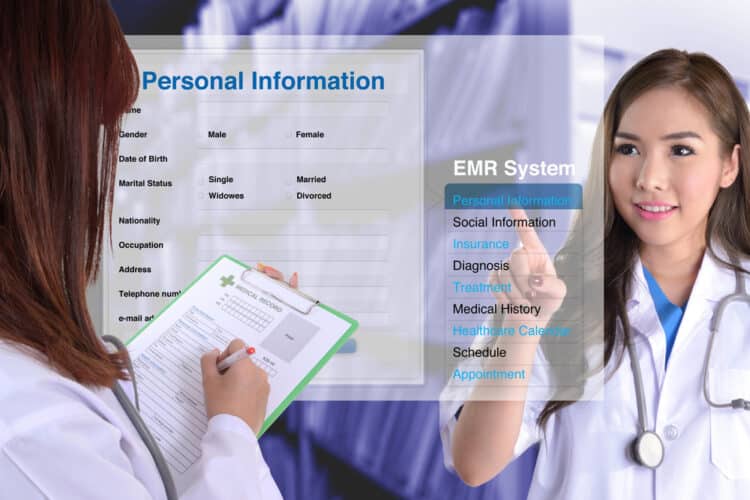7 Days FREE. No Contract. No Setup Fees.
Revolutionize Your Medical Facility with Electronic Health Record EHR System and Practice Management Software
Medical facilities need to start using advanced technologies and modern methods to reduce their workload, eliminate risks of errors, and streamline their work. They need modern technologies so that they can entirely focus on their patients instead of wasting time on paperwork and manual documentation.
Therefore, medical billing service providers offer free medical software to healthcare practices and help them manage their work effectively. Check further to acquire knowledge of how medical software can help you.
What is Medical Software?
Medical software is a computerized practice management system that automates the billing processes of hospitals, clinics, and other medical facilities. Billing companies and medical practices can use this software to optimize revenue, greatly improve their reimbursement rates, and sustain the business’s financial condition.
Medical software can also automate and strandline payment services and invoice processing. The primary reason to use billing software is to help healthcare facilities to get paid faster, keep patient medical reports secure, improve workflow efficiencies, and collect patient crucial medical data.
If you outsource your medical billing services, the billing company may offer you free medical software. With the help of this software, you can access the patient and billing information to provide the best treatment to patients. Also, healthcare facilities can use the system to avoid misunderstandings, often leading to wrong diagnoses and poor-quality treatment.
Let us help you save money and get assistance at 1/3 the cost!
Our Remote Medical Assistants Offer

Insurance Verification Virtual Assistant
Virtual assistants automate insurance verification processes and ensure that patients' insurance information is accurate and up-to-date.

Dental Virtual Assistant
Dental assistants can work remotely from their own computers and manage the dental office's practice with ease by logging into its practice management software.

Medical Transcriptionists
Improve communication between medical providers, conversion of audio recordings, documentation accuracy, and provide a comprehensive secure electronic medical record.

Virtual Medical Scribe
Portiva's Virtual Medical Scribing solution is here to streamline medical documentation, cut admin costs and liberate your staff's precious time. A perfect solution for you!

Medical Billing Virtual Assistant
Medical billing virtual assistants are becoming more popular among physicians' offices as they provide efficient support for managing operations and maximizing revenue.

Prior Authorization
Prior authorization helps doctors avoid unexpected costs and patients avoid unnecessary expenses, ultimately resulting in cost savings for physicians and patients alike.
Benefits of Electronic Medical Records Software
Reduces Paperwork and Errors
Paperwork is becoming antiquated in the medical industry. In fact, small businesses are choosing the better and more effective way of handling billing information and paperwork. They are opting for practice management software that reduces the paperwork in modern facilities.
Medical systems significantly help reduce errors and paperwork required when you manually file forms and store these documents. This saves time and energy for the medical team as well as reduces the risk of misunderstanding while reviewing these documents.
A medical system like EHR software and EMR system offers lab integration. This way all the lab results get collected on a system, helping health experts to check it whenever they need. The free EMR software or others will also help you to check insurance eligibility verification before starting the medical process.
Helps You Save Money
If you invest in in-house software, it can cost you a great amount of money. However, when you hire a medical billing company, they provide free medical software to install in your system. This way, you can save money on installing updated medical software and gain its benefits.
The billing company installs software to help you gain access to the billing information they collect. Your medical stand can use to learn about the claims, money reimbursed, and other information. With this system, you, your medical team, and the billing company can stay on the same page and streamline workflow.
Offers Claim Tracking
Medical billing software can significantly help track and process medical claims. This software allows you to check patient coverage and notify when claims are denied. Based on the software you get, you can also you through the process of resubmitting denied claims.
The software will also remind you of the claims that are being processed. Medical facilities will be alerted if any issue occurs during the billing process so that they stay updated with the company’s billing process. You will also learn if the patient who has visited your clinic can’t cover the treatments with insurance. This helps you design a treatment plan that stays within your patient’s budget and prevents problems for you.
Improved Efficiencies and Patient Care
The patient experience comes as the top priority of medical practices. Like retail and other industries, modern healthcare facilities pay more attention to long-term retention and patient care in the competitive market by providing a seamless experience and offering the best care quality.
The seamless experience for patients entirely depends on payment convenience. Patients require quality electronic and online payment options.
They also need a patient portal to evaluate their bills and benefits to pay for their treatment. Depending on the medical software you choose, they can help you give patients relevant information so they can get satisfied with your support.
More Reliable and Secure Data Management Process
Every healthcare facility’s biggest question is how to keep patient information safe. A few years ago, when healthcare providers used paper to collect data, they kept the file safe in a cabinet with a key and lock. Now, practices are using digital methods to store information prone to hacks. To resolve this issue, medical software offers record storage protected with passwords that prevent data breaches.
But still, there is a problem. It doesn’t protect your records safe from problems like computer crashing or fire. Virtual medical billing software provides a way to keep all the data safe from any disaster or problem. Even if your practice’s computer crashes, the data will stay safe in the Data center and will be accessible with any computer running.
Provides Latest Technology
Virtual medical technology is still new to the medical industry, and some businesses, especially small businesses, lack the latest software. Medical facilities should contact billing service providers to offer more accessible Virtual software.
You should be able to log in to the software wherever you are, and it helps you monitor claims. With this type of software, you can see the real-time challenges in your financial condition that help you understand the effectiveness of billing services.
Makes Patient Care Easy
When you hire a medical billing company, they will perform the billing tasks, from collecting Medical records and creating claims to resubmitting denied claims. This will save time and energy for the medical team, and they can invest in providing quality healthcare to patients.
Besides that, the medical billers will integrate all the information into the free software. So, when healthcare organizations need patient or facility information, they can simply check the software. Hence, you will not waste time opening each file and checking the patient’s information, saving much of your time.
Boost Patient Experience
Satisfied and content patients are critical to the growth of healthcare providers. Healthcare services facilities can improve the patient experience by making the billing process easy to understand and seamless. They can do this by providing digital payment options, online bill updates, and access to detailed treatment information.
The medical billing company and its medical practice management application and software will help you achieve this goal by streamlining billing processes, reducing errors, and enhancing transparency, ultimately boosting patient satisfaction and retention rates.
What are The Best Features of the Medical Billing Free Software?
We already have discussed that medical billing software helps you manage billing information and billing-associated tasks. However, some medical software can also offer you more features. Here are some features that you find in the latest medical software.
When it comes to medical software, another added feature is medical coding, which allows for accurate and efficient coding of medical procedures and diagnoses for billing purposes.
Generates Invoice
The medical software helps Healthcare providers generate invoices that include details of healthcare support and treatment a patient received. Healthcare facilities use these invoices to discuss a patient’s payment.
Making an Appointment
The software will help you know what free slots are available for the appointment. Once you give an appointment, it will appear on your primary calendar, typically linked to your email. This software is also designed to remind your clients about the appointment. Hence, medical software can help you manage your appointments and streamline your work.
Managing and Tracking Unpaid Accounts
Healthcare practices often struggle to track and ask their patients about outstanding payments. Not only is this task boring, but it also distracts doctors from more vital tasks like patient care.
Medical software can make it easier to manage unpaid accounts and check information. Also, the medical billers will contact the patients to pay their dues, preventing you and your medical team from performing this task.
Reporting and Dashboards
The medical team needs to stay aware of different aspects of their practice, such as invoices generated, the number of sessions per month, and payment received. The software you use will be able to provide all this basic information to you.
The Future of Medical Billing Software
The future of medical billing software will be shaped by machine learning and electronic medical record integration, which will automate tasks, predict billing trends, and detect errors. These innovations will streamline billing, reduce denials, and enhance revenue cycle management.
With a focus on cybersecurity, future systems will prioritize secure data handling, helping providers and billing companies optimize operations and improve service delivery for better patient care.
Embracing Technological Innovations
Incorporating technologies like telemedicine and blockchain is crucial for modern healthcare practices. Telemedicine expands patient access and integrates with billing software for accurate virtual visit billing.
Blockchain enhances patient data security with immutable records, fostering trust in medical documentation. Adopting these innovations helps practices stay competitive, improve service delivery, and maintain high patient care standards.
Enhancing Patient Engagement with Digital Tools
Patient interaction is crucial for better health outcomes, with digital tools like mobile health apps, patient portals, and electronic records playing a key role.
These platforms provide easy access to health data, appointment schedules, and personalized resources, improving transparency and convenience. Wearable tech offers real-time monitoring, enhancing patient acquisition by attracting those seeking proactive care.
The Importance of Data Analytics in Healthcare
Data analytics is becoming an invaluable tool in the healthcare industry, offering crucial insights into patient care and operational efficiencies. By analyzing large datasets from medical records, patient feedback, and health data, healthcare organizations can uncover patterns and trends that guide decision-making and policy development within the hospital system.
Predictive analytics enables providers to anticipate patient needs, helping to reduce hospital readmissions and improve preventive care efforts. Furthermore, by leveraging electronic health records to free up medical data, data analytics can optimize resource allocation, ensuring that medical facilities are properly staffed and equipped to meet patient demands using up-to-date electronic health records and medical data.
As healthcare data grows, using advanced analytics tools will be key to improving patient outcomes and reducing costs. By leveraging data-driven decisions, healthcare systems can enhance the overall quality of care, move toward personalized treatment, and foster innovation, especially in settings like nursing homes. Storing data on their own servers ensures better security and efficiency for these improvements.
Telemedicine: Expanding Access to Healthcare
Telemedicine is transforming healthcare by enabling patients in remote and underserved areas to consult with providers from home, reducing the need for in-person visits. By integrating electronic health records (EHRs) into telemedicine platforms, providers can access and update medical records in real-time, ensuring continuity of care.
Telemedicine is transforming healthcare by allowing patients in remote areas to consult providers from home, reducing in-person visits. By integrating electronic health records (EHRs) and electronic records into telemedicine platforms, providers can access and update medical data in real time, ensuring continuous care.
Big Data and Its Influence on Healthcare
Big data transforms healthcare by helping medical professionals predict, diagnose, and treat illnesses more effectively. Analyzing data from electronic health records (EHRs), clinical trials, and wearables uncovers trends that improve patient outcomes.
By leveraging a customized medical records system, healthcare providers can track a patient’s medical history, enabling predictive analytics to optimize hospital resources. Big data also drives precision medicine, tailoring treatments to an individual’s genetics and lifestyle, allowing for a more personalized approach to care.
Additionally, big data enhances the functionality of a practice management system and medical practice management applications by streamlining administrative tasks, improving efficiency, and accelerating drug discovery.
As big data evolves, it promises to revolutionize healthcare, creating a more proactive, personalized, and efficient approach to patient care.
The Role of Telemedicine in Modern Healthcare
Telemedicine is essential in healthcare, providing remote consultations, especially in underserved areas. It enables timely care from home, crucial during emergencies like COVID-19. Free software tools enhance telemedicine by streamlining scheduling and communication.
By integrating electronic medical records and EHR systems, healthcare providers can access key features that improve efficiency. This ensures that medical history is up-to-date and easily accessible to support better outcomes.
The transition from paper charts to electronic medical records allows for faster, more accurate decision-making, providing a more seamless digital version of patient care.
Free medical office software, like practice management tools, supports telemedicine by streamlining scheduling, record management, and billing, improving care delivery. As technology evolves, telemedicine will integrate advanced diagnostics and wearables, enhancing accessibility and cost-effectiveness.
Security technologies will ensure the protection of patient data, foster trust, and maintain data integrity, ultimately transforming healthcare into a more efficient, patient-centered system.
Bottom Line (Electronic Medical Records Software)
In a nutshell, medical billing software may design to help billing companies to perform billing tasks. It can also help healthcare practices manage their work and provide the best support to patients. A medical can use this free medical software to check and verify patient and facility information. They can use it to check appointments, understand the financial condition of the medical institution, secure patients’ data, and determine accepted and denied claims.
If you are looking for an experienced and qualified medical billing company that not only can offer you a robust system but also provide your support and guidance for the billing tasks, Portiva is here to help you. Our well-structured mechanism includes different software, tools, and technologies that make your billing process seamless and approachable. We also offer free EHR software.
Using open-source EMR software or free EHR systems can lead to excellent medical marketing. Since you will be offering people all the features and support, you can use them to market your business.
The best part is that the software we provide is easy to use. You and your medical staff don’t need months of training to use it. Also, our team will always be available to guide you. So, even if you initially struggle to use the system, you can contact us for help.
Efficient medical billing and documentation management is key to any healthcare facility’s success. Embracing Virtual medical software, like free EHR systems, streamlines operations and enhances the accuracy of electronic medical records.
This reduces manual errors and administrative tasks, allowing healthcare providers to focus on delivering better healthcare. With the growing demand for transparent services, leveraging these tools, including a concept dictionary for accurate coding, improves patient satisfaction and financial stability.
Get Your Answer
Frequently Asked Questions
300+
Happy Doctors

Is OpenEMR really free?
When it comes to medical records, various types of software can be used in healthcare organizations. One of the most popular types of software used for medical records is Electronic Health Records (EHR) system. This software is designed to make recording, storing and sharing patient information easier without traditional paper records.
In addition to EHR systems, practice management software and hospital records software can help manage various aspects of health care administration. These products include free software options that offer essential features for smaller practices or hospitals.
While many different options are available for health care providers, fulfillment with records software is typically measured through articles, surveys, and product satisfaction scores. EHR systems are often considered the average choice for healthcare facilities due to their ability to handle electronic records and provide various tools to support health care professionals in their day-to-day work.
When considering which software to use for managing medical records, it is essential to consider the specifics of your health care organization and the features most important to your work. With the right software, improving overall efficiency, accuracy, and quality of patient care in your workplace is possible.
What is a free EMR?
A free EMR is an electronic medical records software available for use without payment. There are numerous varieties of free EMRs, but the most common are open-source EMRs open to anyone to download and use and free versions of commercial EMRs designed to be affordable for smaller practices.
One great example of a free EMR is the open-source project OpenEMR. This application has been available for many years and has a large and active user community that provides ongoing development and support. Another popular option is the cloud-based application TherapyNotes, which offers a free version with limited features that can be a great way to compare different EMRs before committing to a paid version.
When researching free EMRs, it’s always a good idea to read reviews from other users to get a better sense of the strengths and weaknesses of each option. And while a free EMR may have only some of the features of a paid EMR, it can still be a great way to get started with electronic medical records without spending much money.
What is the best medical office software?
The best medical office software satisfies the specific requirements of the healthcare sector. With the increasing shift towards electronic health records and practice management, finding a software solution that can efficiently manage patient data and streamline administrative tasks is essential.
One such solution is a free electronic health records system (EHR system) that incorporates all aspects of patient care. A sound EHR system should be user-friendly for medical professionals while providing comprehensive services such as electronic prescribing, appointment scheduling, and billing.
In addition to its focus on electronic health records, the best medical office software should provide users with a reliable and secure platform for storing patient data. This ensures that confidential patient information is protected while minimizing the risk of data breaches.
Another critical factor to consider when choosing the best medical office software is its ability to integrate with other healthcare applications. A good software solution should provide seamless integration with medical devices, patient portals, and other healthcare applications to help facilitate better care for patients.
Overall, the best medical office software is user-friendly, comprehensive, and can handle all aspects of patient care while ensuring the security and privacy of patient data. So if you’re looking for a robust software solution to help manage your medical practice, explore the benefits of adding an EHR system to your site.
What software is used for medical records?
Electronic Health Record (EHR) software is most commonly used for managing medical records in healthcare facilities. It is a digital version of paper-based medical records containing information about a patient’s medical history, medications, allergies, test results, diagnoses, and more. EHR software provides healthcare professionals with quick and easy access to patient information, facilitates communication between healthcare providers, and improves the overall quality of patient care.




